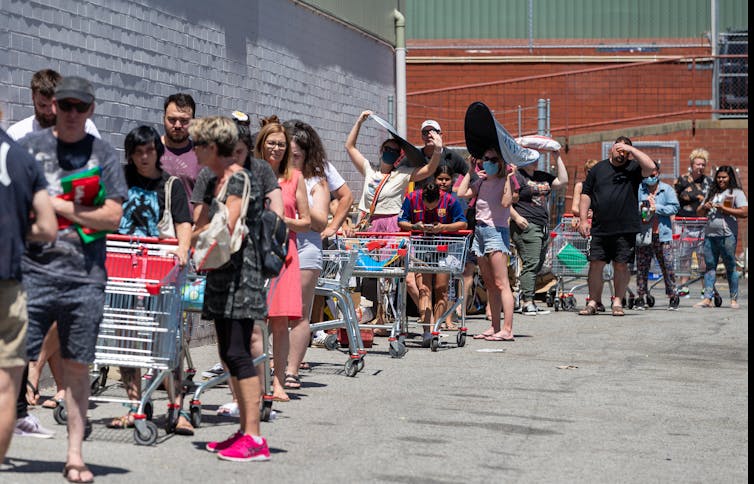Perth's 5-day 'circuit-breaker' lockdown isn't an overreaction to a single case — it's basic common sense
- Written by Erin Smith, Associate Professor in Disaster and Emergency Response, School of Medical and Health Sciences, Edith Cowan University
Perth and the Peel and South West regions of Western Australia will go into a five-day hard lockdown from 6pm local time on Sunday, after one new local COVID-19 case was detected in the state.
The new case is a male security guard who was working on the same floor as a person in quarantine with the UK coronavirus variant.
Contact tracing is underway, and residents have been asked to get a COVID test if they visited any of several venues listed as potential exposure sites.
The lockdown is currently scheduled to last until 6pm on Friday February 5, although Premier Mark McGowan has not ruled out extending the restrictions if necessary.
What do the restrictions mean?
Residents will only be allowed to leave home for four essential reasons: work or study, exercise, to shop for essentials or to access healthcare.
Schools, many of which were scheduled to begin on February 1, will remain closed for the coming week.
Face masks will be mandatory in the state when leaving home for essential reasons.
The WA state election campaign has been suspended, and Big Bash cricket fixtures and Perth Fringe Festival events cancelled for the duration of the lockdown.
McGowan said the lockdown is “a crucial reaction to keep the community safe”.
Border restrictions likely
McGowan has also recommended that other states suspend travel to WA — a blunt tool for dealing with outbreaks of this size.
Restricting travel from specific hotpots can be a successful circuit-breaker to disease transmission.
But hard border closures — particularly with no evidence of widespread community transmission — seem unnecessary and counterproductive at this stage, and are associated with a host of health and economic consequences.
Face masks, meanwhile, can certainly help reduce the risk of disease transmission, and thereby help keep borders open.
Quashing a cluster before it happens
Compared with Victoria’s months-long COVID lockdown, Perth’s latest lockdown — like Brisbane’s earlier this year — aims to stamp out a new COVID cluster before it gains a foothold.
The lockdown will hopefully act as a circuit-breaker, minimising community transmission and allowing health authorities to trace and test anyone who might have been infected.
Disappointingly, meanwhile, Perth supermarkets were hit with a wave of panic-buying, similar to the scenes during previous lockdowns elsewhere.
Read more: Why are people stockpiling toilet paper? We asked four experts
This behaviour is unnecessary and counterproductive. Shops will remain open, and people will still be able to buy what they need during the lockdown. Crowding into shops (especially without wearing masks) directly before the lockdown begins actually increases the risk of infection.
 Shoppers queue at a supermarket in Maylands, one of the exposure sites of the latest outbreak.
Richard Wainwright/AAP Image
Shoppers queue at a supermarket in Maylands, one of the exposure sites of the latest outbreak.
Richard Wainwright/AAP Image
Is the lockdown an overreaction?
Back on January 13, WA’s chief health officer Andy Robertson suggested the state would likely enter a short, sharp lockdown if a coronavirus outbreak was detected within the community.
Going hard and fast was effective in South Australia, and also seems to have been quite effective in Queensland.
Read more: South Australia's 6-day lockdown shows we need to take hotel quarantine more seriously
Queensland chief health officer Jeannette Young said the January 2021 lockdown did indeed act as a circuit-breaker, similar to SA’s November 2020 response, to stop the virus spreading out of control.
“I think Adelaide managed their outbreak brilliantly … it was probably one of the best responses in the country,” she said.
Last year, at the height of Melbourne’s second COVID wave, UNSW professor and epidemiologist Mary-Louise McLaws suggested public health officials were likely to be criticised regardless of their strategy.
“If we call it early, then the public thinks that we’re saying the sky is falling in. If we call it late, then you’re said to not be able to handle an outbreak. So you’re not going to win,” she said.
If health authorities are going to cop criticism either way, this suggests the best strategy is to err on the side of overreacting, rather than underreacting, and aim to be safe rather than sorry.
By this logic, Perth’s five-day circuit-breaker is simple common sense.
Authors: Erin Smith, Associate Professor in Disaster and Emergency Response, School of Medical and Health Sciences, Edith Cowan University





